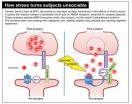(Press-News.org) New research led by Queen's University professor Robert Campbell (Ophthalmology) has revealed using anti-inflammatory medications after glaucoma laser surgery is not helpful or necessary.
Glaucoma is the most common cause of irreversible blindness in the world and about 400,000 Canadians are afflicted with the disease, which is mainly caused by pressure within the eye being high enough to damage the optic nerve. The optic nerve is responsible for sending messages from the eye to the brain and is a vital part of vision.
"The use of strong anti-inflammatory therapies after glaucoma laser surgery became standard practice years ago, in an era when the type of laser we used was much more destructive. Today's laser systems are much gentler, and we felt that the use of anti-inflammatory steroids may not be necessary. In fact, we thought that a small amount of inflammation might actually be helpful in causing greater pressure-lowering effects from the laser treatment," says Dr. Campbell, who also works at Hotel Dieu Hospital.
Dr. Campbell and his research team carried out the first placebo controlled randomized clinical trial focusing on the effects of post-laser medications. They found that steroids and nonsteroidal anti-inflammatory drugs do not affect the ability of the laser treatment to lower eye pressure and do not influence complication rates.
"These findings have the potential to change patient care after glaucoma laser surgery and could save the Canadian healthcare systems millions of dollars by decreasing the use of drugs following this very common procedure," says Dr. Campbell.
The research results were published in Ophthalmology.
INFORMATION: END
A second look at glaucoma surgery
Queen's researcher says use of anti-inflammatory medicines after common eye surgery isn't necessary
2014-09-18
ELSE PRESS RELEASES FROM THIS DATE:
Tropical fish a threat to Mediterranean Sea ecosystems
2014-09-18
The tropical rabbitfish which have devastated algal forests in the eastern Mediterranean Sea pose a major threat to the entire Mediterranean basin if their distribution continues to expand as the climate warms, a new study warns.
The study, by an international team of researchers led by Dr Adriana Vergés of UNSW Australia and Dr Fiona Tomas of the Mediterranean Institute for Advanced Studies in Spain, is published in the Journal of Ecology.
Members of the team surveyed more than 1000 kilometres of coastline in Turkey and Greece, where two species of rabbitfish have become ...
University of Kentucky research explores STXBP5 gene and its role in blood clotting
2014-09-18
LEXINGTON, Ky (Sept. 17, 2014) -- Two independent groups of researchers led by Sidney (Wally) Whiteheart, PhD, of the University of Kentucky, and Charles Lowenstein, MD, of the University of Rochester, have published important studies exploring the role that a gene called STXBP5 plays in the development of cardiovascular disease.
According to Whiteheart, previous genome-wide association studies (GWAS) identified a gene called STXBP5 as a factor that regulates a protein called Von Willebrand factor (VWF).
VWF is an important contributor to normal blood clotting. When ...
UT Dallas study uncovers factors in students' reporting of weapons at school
2014-09-18
As a result of outbreaks of violence in the nation's schools, concerns have grown about school safety and the overall well-being of students.
In a new study, UT Dallas criminology researchers have found that certain factors affect students' willingness to report weapons at school.
"A big part of adolescent development is figuring out your identity, and that does not always mean talking to grown-ups about what is going on," said Dr. Nadine Connell, assistant professor of criminology in the School of Economic, Political and Policy Sciences. "We can't stop students from ...
Improving medicines for children in Canada
2014-09-18
Ottawa (September 18, 2014) – A new expert panel report, Improving Medicines for Children in Canada, released today by the Council of Canadian Academies, addresses the importance of developing safe and effective medicines for children. Each year about half of Canada's seven million children use at least one prescription drug. Much of this prescribing is done off-label (i.e. the prescription differs from the authorized use), creating potential health risks.
Children have historically been excluded in drug research and development, including clinical trials. As a result, ...
Rosuvastatin treatments particularly effective among prediabetic patients
2014-09-18
Los Angeles, CA (September 18, 2014) Cardiovascular disease is the leading causes of death worldwide and high cholesterol plays a major role in accelerating its progression. Medical practitioners have turned to statins as a treatment to decrease cholesterol-carrying lipoproteins such as small dense lipoproteins (sdLDL), considered to be especially harmful. A new study, out today in the Journal of Cardiovascular Pharmacology and Therapeutics finds that rosuvastatin may be more effective among prediabetic patients than patients with normal glucose levels.
Study author ...
Middle school dilemma: Girls' body image affected by older peers
2014-09-18
Los Angeles, CA (September 18, 2014) The media is highly criticized for contributing to body image issues in adolescents. However, a study out today in Psychology of Women Quarterly finds a different source for body dissatisfaction among young girls: older girls at school.
A research team led by Jaine Strauss, Professor of Psychology at Macalester College, surveyed 1,536 5th through 8th-grade female students attending schools with different grade groupings. Some 5th and 6th graders attended school with older students (i.e. in districts that follow the "middle school" ...
How stress tears us apart
2014-09-18
Why is it that when people are too stressed they are often grouchy, grumpy, nasty, distracted or forgetful? Researchers from the Brain Mind Institute (BMI) at EPFL have just highlighted a fundamental synaptic mechanism that explains the relationship between chronic stress and the loss of social skills and cognitive impairment. When triggered by stress, an enzyme attacks a synaptic regulatory molecule in the brain. This was revealed by a work published in Nature Communications.
Carmen Sandi's team went to look for answers in a region of the hippocampus known for its involvement ...
Scientists pioneer microscopy technique that yields fresh data on muscular dystrophy
2014-09-18
Scientists at USC have developed a new microscopy technology that allows them to view single molecules in living animals at higher-than-ever resolution.
Dubbed "Complementation Activated Light Microscopy" (CALM), the new technology allows imaging resolutions that are an order of magnitude finer than conventional optical microscopy, providing new insights into the behavior of biomolecules at the nanometer scale.
In a paper published on Sept. 18 by Nature Communications, the researchers behind CALM used it to study dystrophin – a key structural protein of muscle cells ...
In mice, vaccine stops urinary tract infections linked to catheters
2014-09-18
The most common type of hospital-associated infection may be preventable with a vaccine, new research in mice suggests.
The experimental vaccine, developed by researchers at Washington University School of Medicine in St. Louis, prevented urinary tract infections associated with catheters, the tubes used in hospitals and other care facilities to drain urine from a patient's bladder.
Each day a catheter is present in the urethra and the bladder, the risk of urinary tract infection increases. Nearly every patient who has a catheter for more than 30 days acquires a urinary ...
Migraine in middle age linked to increased risk of Parkinson's, movement disorders later
2014-09-17
MINNEAPOLIS – A new study suggests that people who experience migraine in middle age may be more likely to develop Parkinson's disease, or other movement disorders later in life. Those who have migraine with aura may be at double the risk of developing Parkinson's, according to the study published in the September 17, 2014, online issue of Neurology®, the medical journal of the American Academy of Neurology.
"Migraine is the most common brain disorder in both men and women," said study author Ann I. Scher, PhD, with Uniformed Services University in Bethesda, MD, and ...
LAST 30 PRESS RELEASES:
Brain cells drive endurance gains after exercise
Same-day hospital discharge is safe in selected patients after TAVI
Why do people living at high altitudes have better glucose control? The answer was in plain sight
Red blood cells soak up sugar at high altitude, protecting against diabetes
A new electrolyte points to stronger, safer batteries
Environment: Atmospheric pollution directly linked to rocket re-entry
Targeted radiation therapy improves quality of life outcomes for patients with multiple brain metastases
Cardiovascular events in women with prior cervical high-grade squamous intraepithelial lesion
Transplantation and employment earnings in kidney transplant recipients
Brain organoids can be trained to solve a goal-directed task
Treatment can protect extremely premature babies from lung disease
Roberto Morandotti wins prestigious Max Born Award for pioneering research in quantum photonics
Scientists map brain's blood pressure control center
Acute coronary events registry provides insights into sex-specific differences
Bar-Ilan University and NVIDIA researchers improve AI’s ability to understand spatial instructions
New single-cell transcriptomic clock reveals intrinsic and systemic T cell aging in COVID-19 and HIV
Smaller fish and changing food webs – even where species numbers stay the same
Missed opportunity to protect pregnant women and newborns: Study shows low vaccination rates among expectant mothers in Norway against COVID-19 and influenza
Emotional memory region of aged brain is sensitive to processed foods
Neighborhood factors may lead to increased COPD-related emergency department visits, hospitalizations
Food insecurity impacts employees’ productivity
Prenatal infection increases risk of heavy drinking later in life
‘The munchies’ are real and could benefit those with no appetite
FAU researchers discover novel bacteria in Florida’s stranded pygmy sperm whales
DEGU debuts with better AI predictions and explanations
‘Giant superatoms’ unlock a new toolbox for quantum computers
Jeonbuk National University researchers explore metal oxide electrodes as a new frontier in electrochemical microplastic detection
Cannabis: What is the profile of adults at low risk of dependence?
Medical and materials innovations of two women engineers recognized by Sony and Nature
Blood test “clocks” predict when Alzheimer’s symptoms will start
[Press-News.org] A second look at glaucoma surgeryQueen's researcher says use of anti-inflammatory medicines after common eye surgery isn't necessary




